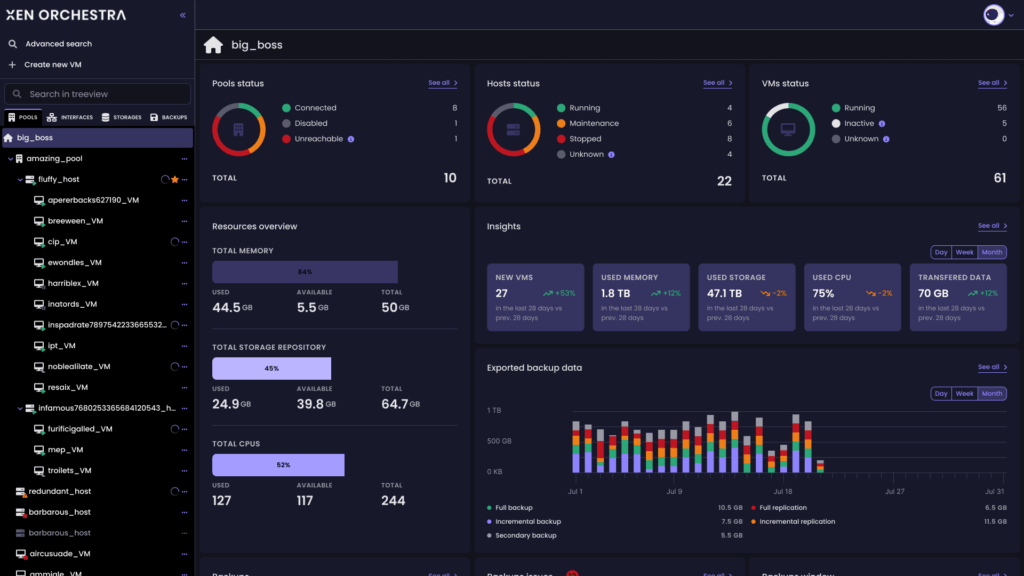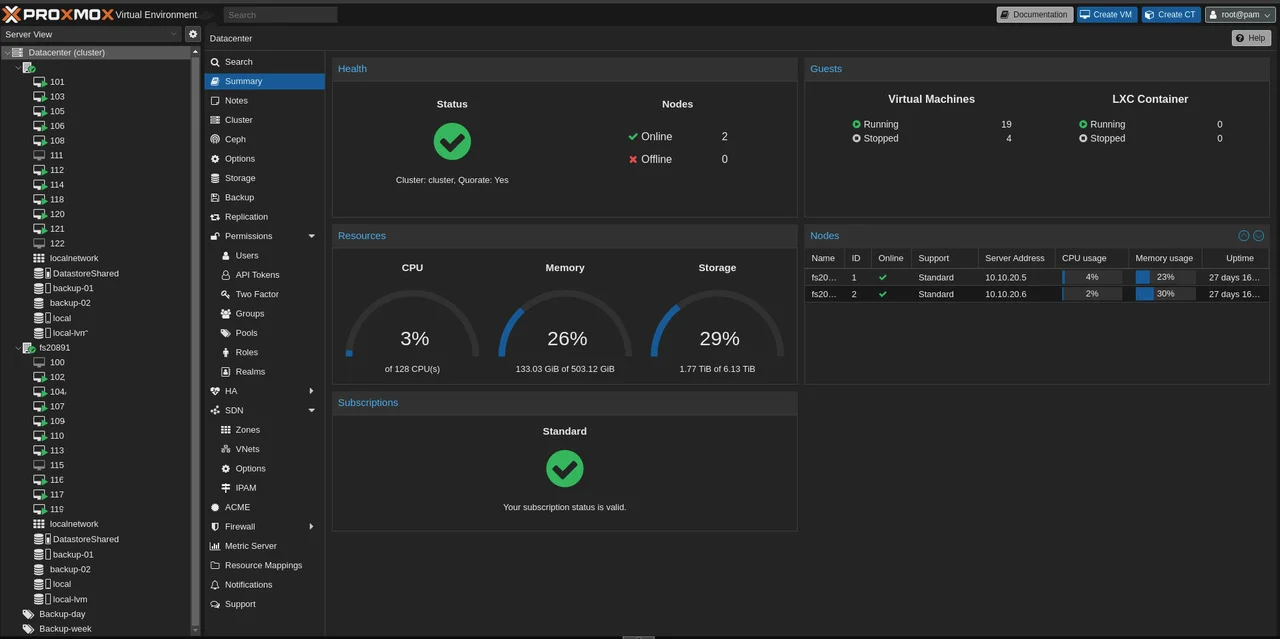
XCP-ng vs Proxmox: Which Open-Source Virtualization Platform Works Best?
With VMware licensing changes and hyperscaler pricing forcing many businesses to rethink their strategy, open-source options like Proxmox VE and XCP-ng are getting more attention. Both are free to use, backed by strong communities, and ready for production at scale.
Cost is a major factor driving people to seek alternatives. VMware’s subscription model can easily climb into the tens or hundreds of thousands of dollars each year, depending on how many cores you license and which features you need.
On the other hand, Proxmox support subscriptions start at under $1,000 annually for a small cluster, making it far more accessible for businesses that want enterprise capabilities without enterprise pricing. Some organizations even report cutting virtualization costs by more than 80% after moving to open-source platforms.
So which is the better fit for your enterprise? Let’s explore.
What Is XCP-ng?

XCP-ng is based on the Xen Project hypervisor, originally developed from Citrix XenServer. Relaunched as a community-driven project in 2018, XCP-ng has grown into a stable, secure, and scalable open-source virtualization solution.
It uses Xen Orchestra (XO) as its web-based management tool, which provides strong monitoring, backup scheduling, and VM lifecycle controls.
Key highlights include:
- High availability clustering
- Live migration with minimal downtime
- Multi-tenancy and SR-IOV for secure resource isolation
- Snapshot-based backups with Xen Orchestra
- Broad third-party backup integration (Veeam, Bacula, Commvault)
- Flexible pricing via support subscriptions from Vates
XCP-ng often appeals to service providers and HPC research labs thanks to its security model, bare-metal performance, and strong ecosystem integrations.
What Is Proxmox VE?

Proxmox Virtual Environment (VE) is an open-source virtualization platform that combines Kernel-based Virtual Machine (KVM) for full virtualization and Linux Containers (LXC) for lightweight workloads.
It provides a web-based interface that simplifies complex infrastructure management, allowing users to easily control VMs, containers, networking, and storage from a single location.
Key highlights include:
- High availability clustering
- Live migration between hosts
- Flexible storage with Ceph integration
- Built-in backup and restore
- Open-source licensing with optional enterprise support
Looking to migrate without overlap costs?
Migration shouldn’t drain your budget. With HorizonIQ’s 2 Months Free, you can move workloads, skip the overlap bills, and gain extra time to switch providers without double paying.
Get 2 Months FreeHow Do Proxmox and XCP-ng Handle Backups?
Proxmox:
- Proxmox Backup Server (PBS) is fully integrated, offering incremental backups, deduplication, encryption, and compression.
- Backups can be scheduled directly in the web interface.
- Recovery is flexible, you can restore entire VMs or individual disks.
XCP-ng:
- Relies on Xen Orchestra for scheduling and management.
- Supports snapshots, full backups, and incremental backups.
- Strong ecosystem with third-party backup solutions like Veeam.
Takeaway: Proxmox provides a native, all-in-one enterprise backup stack. In contrast, XCP-ng leans on flexibility and integrations with existing and third-party tools.
What Storage Options Are Available?
Proxmox:
- Local storage: LVM, ZFS.
- Shared storage: NFS, iSCSI, SMB/CIFS.
- Distributed storage: Native Ceph integration for hyper-converged deployments.
XCP-ng:
- Local pools and NFS/iSCSI shared storage.
- Uses VDI format for VM disks.
- Third-party storage systems are often required for redundancy.
Pro tip: Proxmox is the better choice for built-in hyper-converged storage (via Ceph). XCP-ng fits if you’re maintaining a SAN/NAS-based architecture.
How Does XCP-ng vs Proxmox Compare on Networking?
Proxmox:
- Supports Linux Bridges, VLAN tagging, and VXLAN encapsulation.
- Open vSwitch provides advanced topologies for complex enterprises.
- Proven in multi-VLAN deployments where segmentation and compliance are critical.
XCP-ng:
- Offers SR-IOV networking for near bare-metal performance.
- Strong fit for HPC clusters and research facilities with high-throughput workloads.
Takeaway: Proxmox wins in flexible enterprise networking, while XCP-ng excels at performance-focused networking.
How Do They Perform in Enterprise Production?
At HorizonIQ, our Proxmox Private Cloud has delivered measurable performance, resiliency, and cost efficiency:
- Powers a 19-node HA cluster with 760 vCPUs, 9.7 TB RAM, 90 TB Ceph storage, and 225 TB flash-backed storage, supporting hundreds of production and dev/test workloads.
- Provides live migration across nodes with no downtime, ensuring seamless maintenance and load balancing.
- Uses Ceph hyper-converged storage for built-in redundancy and scalability.
- Integrates with Proxmox Backup Server for incremental, deduplicated, and encrypted backups across the cluster.
- Delivered cost savings of $285K–$519K/year down to $15K/year, reducing VMware licensing expenses by more than 94%.
At Ikoula, a French cloud provider running XCP-ng in production, has found the following success pairing XCP-ng with CloudStack:
- Operates 100+ hosts across 8 zones, serving over 6,600 customers in a multi-tenant environment.
- Performs live updates and upgrades with zero downtime, maintaining service continuity during maintenance.
- Leverages XCP-ng’s isolation model for secure, large-scale multi-tenancy, supporting thousands of independent workloads.
- Reduced reliance on third-party vendors, achieving greater autonomy and lower costs with an open-source virtualization stack.
Verdict: Both deliver enterprise-level performance. Proxmox has proven itself as a VMware replacement at scale, enabling us to cut licensing costs dramatically while maintaining enterprise resiliency. When paired with CloudStack, XCP-ng is validated in large-scale, multi-tenant cloud hosting environments like Ikoula’s, demonstrating its stability and efficiency under continuous production demands.
How Do Pricing and Support Compare?
| Feature | Proxmox VE | XCP-ng |
| License Model | Open-source (free) | Open-source (free) |
| Enterprise Support | Subscription-based (€110–€1,495/year per node) | Paid support from Vates (€340–€1,020/year per node) |
| Updates | Enterprise repository access with subscription | All users receive updates; support adds SLA & hotfixes |
| Backup | Built-in Proxmox Backup Server | Built-in via Xen Orchestra, third-party support |
| Storage | Ceph, ZFS, iSCSI, NFS, SMB | NFS, iSCSI, local pools, VDI format |
| Networking | VLAN, VXLAN, OVS, Bridges | SR-IOV, VLANs, virtual switches |
| Best Fit | Hyperconverged, VMware alternative, mixed workloads | Service providers, HPC, third-party ecosystem reliance |
Takeaway: Both are dramatically cheaper than VMware, Nutanix, or large cloud providers. Proxmox is cost-effective at a large scale, while XCP-ng support tiers appeal to smaller clusters or service providers.
Which Use Cases Does Each Platform Excel At?
Proxmox excels at:
- VMware replacement for enterprise IT.
- Hyper-converged storage deployments.
- MSPs delivering VPS hosting with HA.
- Compliance-heavy industries that need integrated backup/DR.
XCP-ng excels at:
- Service providers offering multi-tenant environments.
- HPC workloads that need SR-IOV networking and GPU passthrough.
- Enterprises relying on third-party backup/storage ecosystems.
- SMBs that need low-cost entry virtualization.
Which Platform Should Your Enterprise Choose?
Test both platforms in your environment, as performance and suitability depend on specific workloads and hardware. The choice between Proxmox and XCP-ng comes down to priorities:
- Choose Proxmox if you want: Integrated backup, Ceph-based hyper-converged storage, container support, flexible networking, and a proven VMware alternative that can scale to hundreds of nodes.
- Choose XCP-ng if you want: SR-IOV networking, strong multi-tenancy, and integration with third-party backup and monitoring ecosystems.
With VMware’s dominance waning, enterprises have more freedom than ever. At HorizonIQ, we’ve proven that Proxmox delivers enterprise-grade performance, resiliency, and economics. If you’d like to determine if Proxmox VE is the right fit for your environment, we encourage you to try our 14-day free trial today.


